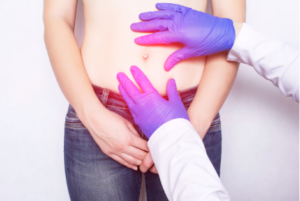
A hernia burst, also known as a ruptured hernia, is a rare but dangerous complication that demands immediate medical attention. While most hernias develop slowly and can be managed or repaired surgically, a burst hernia can lead to life-threatening consequences if not treated on time.
Dr. Manu Shankar, a leading laparoscopic and general surgeon in Faridabad, explains everything you need to know about this condition, including signs to watch for, potential complications, and how it’s treated.
What Is a Hernia?
A hernia occurs when an internal organ or tissue pushes through a weak spot in the muscle or surrounding tissue wall, often in the abdomen. Common types include:
-
Inguinal hernia (groin area)
-
Umbilical hernia (around the belly button)
-
Incisional hernia (through a scar)
-
Hiatal hernia (upper stomach, through diaphragm)
Can a Hernia Burst?
In very rare cases, a hernia can “burst” or rupture — this doesn’t mean an explosion, but rather a tearing or severe breakdown of the hernia sac or overlying skin, which can lead to exposure of internal contents, including intestines. This is considered a surgical emergency.
Causes of a Ruptured Hernia
Several factors may increase the risk of a hernia rupture:
-
Ignored or untreated hernia for a long period
-
Excessive strain on the abdomen (heavy lifting, coughing, constipation)
-
Obesity
-
Injury or trauma to the hernia site
-
Infections or wound complications (especially after surgery)
Symptoms of a Hernia Burst
If you suspect a hernia has burst, look for these alarming signs:
-
Sudden, severe abdominal pain
-
Swelling and redness at the hernia site
-
Skin breakdown or visible intestines through the skin
-
Fever or chills (sign of infection)
-
Nausea or vomiting
-
Inability to pass gas or stool (sign of bowel obstruction)
⚠️ Don’t wait — these symptoms require immediate medical or surgical intervention.
Why a Burst Hernia Is Dangerous
When a hernia ruptures, it may lead to:
-
Strangulation – Blood supply to the herniated organ is cut off, leading to tissue death.
-
Sepsis – A life-threatening infection can occur if bacteria enter the bloodstream.
-
Bowel obstruction or perforation – Trapped intestines can become blocked or even perforated, requiring emergency surgery.
Treatment for a Ruptured Hernia
According to Dr. Manu Shankar, the only solution for a burst hernia is emergency surgery. This involves:
-
Repairing the torn muscle or fascia
-
Removing or repairing damaged bowel tissue (if strangulation occurred)
-
Cleaning any infected areas
-
In some cases, placing a surgical mesh to reinforce the area
Dr. Shankar uses advanced laparoscopic techniques wherever possible, which reduce recovery time, pain, and post-surgical complications.
Preventing a Hernia From Bursting
Here are simple but effective tips:
-
Seek early treatment – Don’t delay hernia repair surgery.
-
Avoid heavy lifting or straining
-
Maintain a healthy weight
-
Manage chronic cough or constipation
-
Follow up regularly with your surgeon
Consult the Best Laparoscopic Surgeon in Faridabad
If you or a loved one is experiencing hernia symptoms or complications, don’t wait for it to worsen. Dr. Manu Shankar, known for his expertise in hernia repair and laparoscopic surgery in Faridabad, offers both preventive and emergency care.
Book a consultation today and ensure you receive the safest and most advanced hernia treatment available.
FAQs
Q. Can a hernia heal on its own?
No, hernias don’t heal naturally and often get worse without surgical treatment.
Q. Is a burst hernia fatal?
If untreated, it can lead to life-threatening complications like sepsis or bowel strangulation.
Q. How quickly should I go to the hospital if my hernia bursts?
Immediately. It’s a medical emergency.

